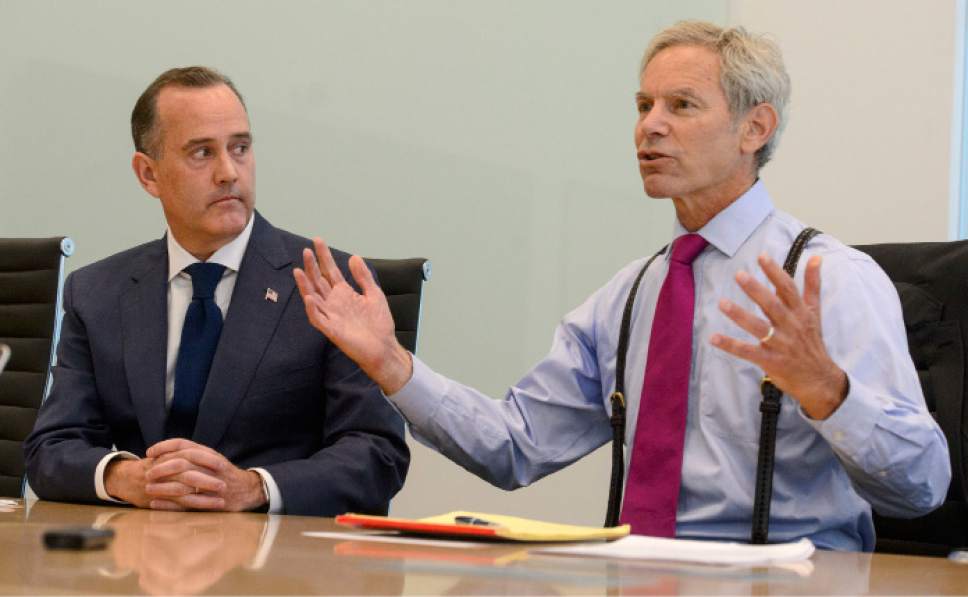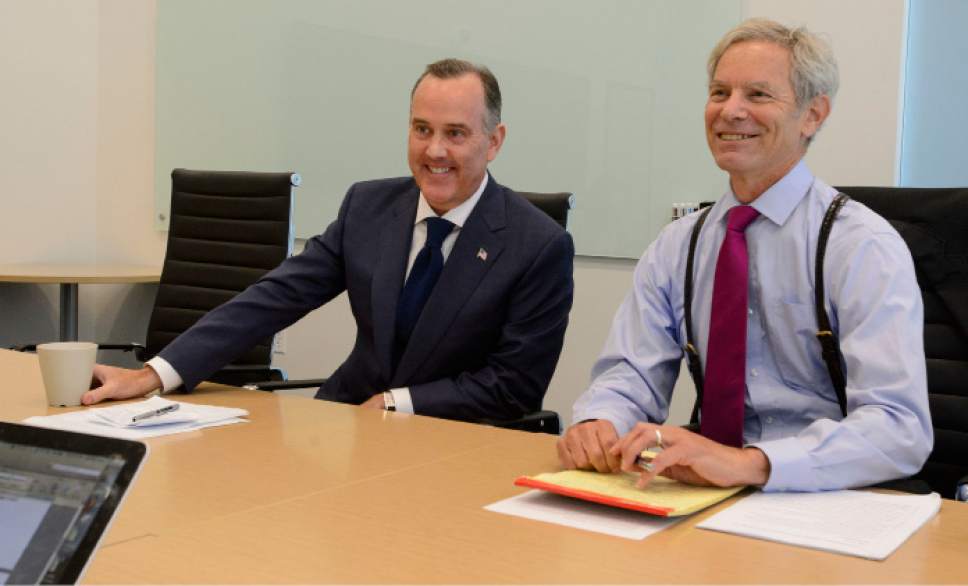This is an archived article that was published on sltrib.com in 2017, and information in the article may be outdated. It is provided only for personal research purposes and may not be reprinted.
Leaders of the bipartisan Better Boundaries initiative filed Thursday to start a petition drive to give voters the chance to form an independent commission to redraw congressional and legislative district boundaries after the 2020 census.
That move comes in the wake of allegations that the Legislature gerrymandered to give Republicans unfair advantages.
"When you have politicians picking their voters, they are going to pick the voters that best support them personally," said Ralph Becker, co-chairman of the group and a former Democratic lawmaker who left the Legislature to become Salt Lake City mayor. "Having lived intimately through this, I really saw that it brought out the worst in people."
Could an independent commission solve that?
"It can't hurt," said the group's other co-chairman, Jeff Wright, a former GOP candidate for Congress and national finance director for former Gov. Jon Huntsman's presidential campaign in 2012. "There is no downside. To have a more accountable and transparent process is always positive."
He added, "This is a bipartisan issue because, while the last redistricting and gerrymandering here in Utah benefited the party I support, in many other states it goes against the party I support. To avoid mutual assured destruction across the country, we need to have independent commissions."
The Utah Legislature redraws political boundaries for congressional races, the state school board and its own contests, subject to potential veto by the governor. It always proves controversial as politicians seek an edge.
The initiative would change the process so that a commission would draw boundaries, and lawmakers would hold an up-or-down vote on them without amendments. If the Legislature rejected the commission maps and drew its own, it would be required to explain why.
The initiative also would create a list of standards that the commission must follow.
Those standards generally would mandate that new districts follow city and county boundaries as much as possible, keep districts compact and prohibit use of partisan data or consideration of addresses of incumbents.
"Right now, if you look at the state Legislature's process and approach, there are almost no standards" beyond making districts of equal population, Becker said. "After that, it's a free-for-all."
The commission would have seven members. The governor, the House speaker, the Senate president and minority leaders of each house would each appoint one member. Two others — without political party affiliation — would be appointed, one each by Democratic and Republican legislative leaders.
When asked whether gerrymandering has occurred in Utah, Becker responded, "Without question." He said he saw it when he was the Utah House Democratic leader after the 2000 census, when Salt Lake City was split into three congressional districts to dilute its Democratic vote. (In 2011, Salt Lake City was kept intact in a single congressional district, but Democrat-friendly Salt Lake County was sliced into three mostly Republican districts.)
"The goal was to maximize political gain and protect incumbents," he said. "I was even told the No. 1 target in that redistricting effort was to make it impossible for [former Democratic Rep.] Jim Matheson to stay in Congress."
After the last redrawing, Matheson accused legislators of splitting up his old district four ways and making re-election impossible in the district where he lived — so he chose to run in an adjacent district that included more sections of his old district.
With the unusual move, Matheson barely won re-election — by 768 votes — over challenger Mia Love in 2012. Two years later, he chose not to seek re-election, and Love won the seat.
Becker said gerrymandering also occurs to help legislators, citing a three-way split of Summit County to dilute the strength of Democratic areas, even though the county could form a district itself. "My neighbors and friends probably vote differently [than] I vote, but they should be represented," said Wright, a resident of Park City.
Last month, a nationwide analysis by The Associated Press said Utah redrew its legislative districts in a way to give the GOP extra help. It said Republicans won an average of 64 percent of the votes in each district, but it won 83 percent of all the seats.
The AP analysis concluded that redistricting helped Utah Republicans win three more seats than they likely would have if districts had been drawn more objectively.
Better Boundaries must gather 113,143 signatures to qualify for the 2018 ballot. Becker and Wright said they will use volunteer and paid signature-collectors.
"We're going to do this on the cheap" with donations raised from Utahns, Wright said. "Given the polling numbers we've seen for the support in Utah for this initiative, we do not believe it's going to be that difficult to get the required signatures."
A UtahPolicy.com poll two years ago found that 65 percent of Utahns favor an independent commission to handle redistricting, while 25 percent believed the Legislature should keep the responsibility.
While the public may like an independent commission, the Legislature does not. Rep. Rebecca Chavez-Houck, D-Salt Lake City, has for years pushed bills to create an independent advisory group to oversee redistricting in 2021. HB411 failed to receive even a hearing.





